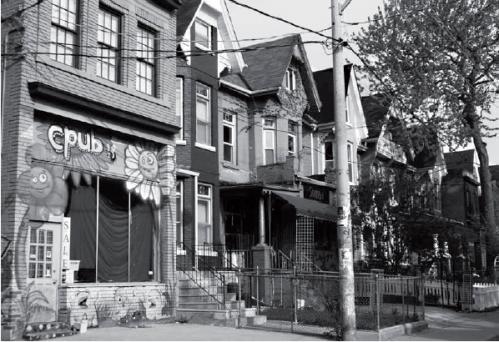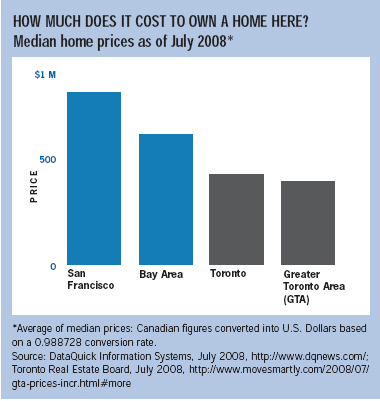We have an affordable housing problem in San Francisco. Specifically, the need for housing for the homeless, rental housing and affordable housing for purchase far outstrips the available supply. Toronto shares both a similar demand for affordable housing and similar obstacles to resolving the problem.
San Francisco faces a shortage of affordable housing both for rent and for purchase. While the federal government is moving away from its commitment to fund affordable housing, state resources are also at risk of running thin. Though San Francisco itself does have some affordable housing resources, including the City’s aggressive inclusionary housing law, these resources are not nearly enough to cover the need. San Francisco’s status as one of the most expensive housing markets in the country means that when purchasing an affordable unit being sold at 100 percent of the median income, a family of four still must have an annual income of more than $70,000. Many would argue that in spite of its classification, this is not truly affordable to the family buying the unit. While more affordable units are scheduled to be available in the next five years, I am often left to wonder if our city soon will be one where there is no middle class. Some rental housing will be available for low-income residents, and the wealthy always will be able to purchase a home, but for the average two-income working family, a move outside of the city will be required for home ownership.

There is a similar problem with affordable housing in Toronto. Toronto is a vast city of 244 square miles and more than 2.5 million people, and it is anticipated that within the next 10 years, more than 1 million people will migrate to Toronto. Half of the people who live in the city are not from Toronto, and the city boasts of a population of residents from all over the world who speak many different languages. While a walk down the street reveals people of all colors, and one may catch snippets of conversations occurring in different languages and different accents, the city government does not appear to be as representative of the people of the city. Toronto is proud to call itself one of the most multicultural cities in the world, yet poverty and housing issues are becoming more racially polarized than they have been in the past. A plan is needed to deal with the influx of people expected in the coming decade. The plan must include transportation, jobs and housing. With the lack of federal, regional and even local funds, fixing the problem — or at least preventing it from getting any worse — seems a daunting task. However, it is heartening to know that many studies have been done and a 10-year housing strategy is in place for Toronto. The big question will be whether sufficient money will be available to make the strategy work.
In 1998, the City of Toronto declared homelessness a national disaster. Since then, Toronto has adopted a plan to reduce homelessness by closing shelters and building homes. In 2007 the city released the Housing Opportunities Toronto plan, effective through 2018. HOT sets out a strategy for building homes for the homeless, providing rental supplements to assist people in their effort to afford rents, enabling the renovation and sustainability of public housing, and providing for the creation of new affordable rental housing and the creation of affordable homes for purchase. The thought is that by creating affordable-housing opportunities, you build a healthy economy and create livable neighborhoods.
Under this plan, 209,000 new and renovated affordable homes will be created over the next 10 years. Currently, Toronto provides less than 1,000 new or renovated affordable homes annually. In 2007, the goal was to invest millions of dollars into a fund to create new housing, repair existing housing, create additional shelter beds in the short term and provide rental assistance. Additionally, no cuts were to be made to housing and homeless funding, new zoning and planning requirements were to be passed that would require mixed income housing in all city developments, and new taxes were to be implemented to increase revenue.

The problem is that in 2007, none of this happened. Instead, the Toronto City Council rejected the idea of a housing investment fund, created new taxes that will go to the general fund and not to a housing fund, and decided that the issue of zoning and planning requirements should be discussed within the Housing Opportunities Toronto plan. So what has happened with the HOT plan? Well, there is very little, if any, money in it.
The good news is that the housing issue is a hot topic in Toronto. There is growing concern over large housing developments that were built in the 1960s and now have outlived their usefulness. Those developments must be demolished or renovated. There are a lot of discussions about the public transportation system and the fact that transit does not meet the needs of many of the people who live on the outskirts of the city, most of whom live in affordable housing and require public transportation to get to and from their jobs. There are also discussions about creating neighborhoods that include people from all income levels, instead of polarizing neighborhoods based on economic income. The mayor is committed to the HOT plan, which is a good start toward tackling the issue.
San Francisco and Toronto are facing similar issues. Both are beautiful cities with a lot of charm, charismatic people, and many places for tourists to visit and enjoy. They are both very livable cities — if you are employed and earning well more than the median income. For both of these cities, the leaders need to harness their resources and energy not only to create plans for ending homelessness or creating affordable housing, but also to put the words into action by funding these housing plans. If they do this, the charm, beauty and livability that Toronto and San Francisco embody can be realized.